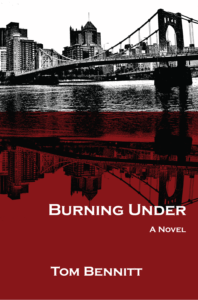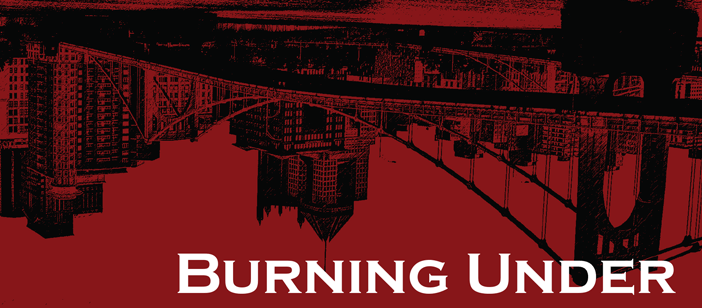“In the wake of a deadly mine explosion, a trio of unlikely heroes bands together to take down a crooked coal company. Chock-full of Western Pennsylvania atmosphere and attitude, Tom Bennitt’s debut opens like a whistleblower novel before snowballing into a thriller about the price of loyalty and betrayal. As folks around here know, lawyers, guns and money can’t fix everything.” – Stewart O’Nan, author of Snow Angels
From the publisher: “Set in southwestern Pennsylvania, Burning Under is a cerebral literary thriller that centers around a deadly coal mine explosion. A polyphonic narrative, the point of view shifts between three people whose lives are shaken by the disaster. Larry, a veteran miner haunted by his past, survives the explosion, but cannot avoid the media spotlight or the hero label. Denise, a young nurse, tries to escape her troubled marriage by taking a job at a Pittsburgh hospital. And Simon is a disgruntled lawyer for Commonwealth Energy who suspects the accident was caused by his company’s low safety and ethical standards. Assisted by his girlfriend, a Pittsburgh journalist, Simon digs around and uncovers a trail of evidence and a massive cover-up engineered by the CEO, George Blount. Linked by a common desire to expose the company, Simon, Larry, and Denise form an alliance; but George will do anything to conceal the truth and exact revenge, provoking a violent end.”
About the Author: Raised in western Pennsylvania, Tom Bennitt earned his MFA from the University of Mississippi and his PhD from Nebraska. His fiction and nonfiction have appeared in several literary journals, including Texas Review, Word Riot, and Prairie Schooner. His debut novel, Burning Under, was shortlisted for the George Garrett Fiction Prize. The 2017 Emerging Writer-in-Residence at Penn State-Altoona, he now resides in the Pittsburgh area with his family.
“Move over John Grisham and Ron Rash, there’s a new sheriff in town! Burning Under is a terrific story of greed and grief, the people caught in the wheels of a corrupt industry, and the lawyers and environmentalists who rise up to fight back. This is a timely story that is also timeless. The novel’s economic style and fast pacing, leavened with humor, keeps this story racing to the end, leaving us breathless and hungry for his next installment, because this is a major debut and Bennitt is going to be a major literary voice in years to come. Believe me, once you pick up Burning Under you won’t put it down!” –Jonis Agee, author of The Bones of Paradise
Chapter One
Coal Veins
 Larry’s truck snaked along the valley road, the bald tires sliding in slush. Steep ridges flanked the road, concealing this bastard land from the modern world. A thick fog oozed off the river and swallowed the light from his truck’s one good headlamp. He stopped on the shoulder, left it running, and jumped out. He scooped a handful of snow and spread it across the muddy front windshield. All around him, chunks of wet snow dropped from burdened branches of spruces and hemlocks. Late March thaw. First glimmer of spring.
Larry’s truck snaked along the valley road, the bald tires sliding in slush. Steep ridges flanked the road, concealing this bastard land from the modern world. A thick fog oozed off the river and swallowed the light from his truck’s one good headlamp. He stopped on the shoulder, left it running, and jumped out. He scooped a handful of snow and spread it across the muddy front windshield. All around him, chunks of wet snow dropped from burdened branches of spruces and hemlocks. Late March thaw. First glimmer of spring.
He reached behind the driver’s seat and felt around the cab floor – pushing aside the twelve-gauge and coffee can full of buckshot – until his fingers gripped the deer spotter. When he pulled back on the road, he steered with his right hand and held the spotter with his left. The strong beam of light knifed through the haze and pointed the way forward. He downshifted at the base of a steep grade. As he rounded a switchback he swerved to avoid a coal truck, screaming downhill. Assholes, he thought, always going Mach Three, trying to squeeze in more runs. Soon, the road narrowed and turned to gravel. The rotten-egg stench of sulfur draped the air. He passed the two boney piles of coal, like black pyramids, beside the tipple, and the company sign – COMMONWEALTH ENERGY, SARVER MINE – and, finally, the security booth, nodding to the guard who had beady eyes that made Larry think of Charles Bronson.
He parked beside an old Tacoma, owned by his buddy, Tree. He got out and circled the truck. Dented quarter panel. Rust spots on the hood. Exhaust pipe rigged to the back bumper with a coat hanger. The truck bed held a fishing pole, a crossbow, and a case of Iron City beer. He brought his face up to the driver’s side window. Tree was passed out: sprawled across the bench seat, mouth agape, blanketed by his Carhartt jacket.
Larry tapped the window a few times. No response. He opened the door.
Tree shot up, rubbing his bloodshot eyes. “What time is it?”
“About seven. You sleep here?”
Tree cracked his neck. “Got a little banged up. If I went home, would’ve slept in.”
A tall black man, the tallest miner Larry knew, Tree’s real name was Calvin but no one called him that. During his second Iraq tour, shrapnel from a roadside bomb caught the artery behind his knee. Now, three surgeries later, he walked with a slight limp.
Larry climbed the warped wooden steps to the miners’ change room, an old trailer. He punched his time card and opened his locker. Removed his coat and Steelers cap. Threw a sweatshirt over his overalls and his faded THIN LIZZY t-shirt. He laced up his steel toes and clipped the mining hammer and self-rescuer device, a small oxygen canister, onto his belt. He pulled his gray hair into a pony tail and adjusted his hardhat. Completing his morning ritual, he rubbed his forearm tattoo – a pickaxe and shovel, intersecting to form an X – for safety.
As the mantrip rattled through the cool damp darkness, Tree talked about the dog races, and how he’d won on a longshot greyhound named Phantom. They reached their workstation and got out. The top of Larry’s helmet barely cleared the tunnel’s roof.
The Sarver Mine was one of the last underground mines in Pennsylvania. Most companies had switched over to strip mining, using machines – rippers and hydraulic shovels – instead of human labor. Sometimes the land above would subside, and some old farmer would have to be compensated for the damage, but this method was still cheaper than underground mining. And while strip mining wasn’t quite eco-friendly, it was child’s play compared to the mountaintop removal mining – scalping the tops of mountains with gigantic dozers and front-loaders – done in West Virginia and Kentucky. Down there, nothing was sacred.
You needed good hands to run the continuous miner. You had to know when to hold back, and when to push the ripper head deeper into the coal seam. It was the best paying job, but also the hardest. You couldn’t show up drunk or high and expect to make six cuts of coal in a shift. But Larry’s hands were rusty. He’d just started two weeks ago, his first mining job in five years. He’d quit on the doctor’s advice, after he started coughing up flecks of blood. That was just a month after learning of his son Josh’s death in Afghanistan. Could the world get any crueler than that? His son had been everything, his only family. Josh’s mom, Kelly, had divorced him long before, when Josh was fourteen.
Larry decided to pack up and leave home. He figured a change of venue might do some good. He traveled around the country, picking up jobs when he needed money. Worked in a meatpacking plant in Nebraska. Hung drywall in Mississippi. Drove a forklift in a Kentucky. But after a few years of drifting he returned home. With a pile of debt and a house he couldn’t sell, he started mining again. He did it for the money, and thanks to the recent coal boom, the money was damn good. If that made him a greedy old redneck, he’d made peace with it.
This excerpt of Burning Under is published here courtesy of the author and should not be reproduced without permission.

























